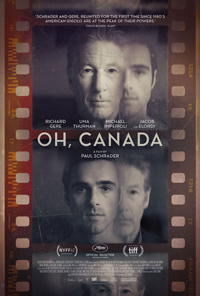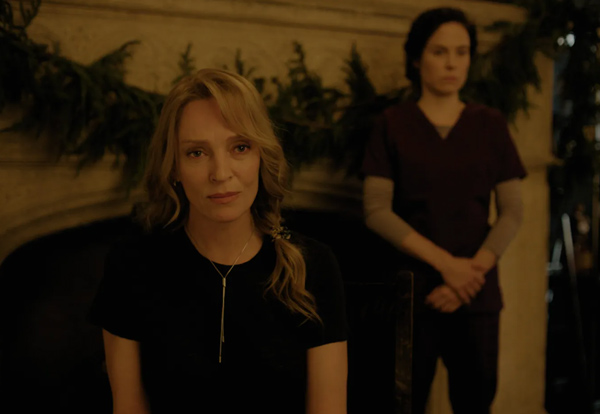Pieces of a Man: Schrader Explores Atonement in Toned Down Adaptation
 Throughout his illustrious career as a director and screenwriter, Paul Schrader has specialized in crafting characters, most often men, wracked with guilt and anxiety, searching for forgiveness. His twenty-fourth feature, Oh, Canada seems a perfect fit, seeing as it’s all about a filmmaker on his deathbed getting one last desperate shot at expiation. The second novel by Russell Banks (who passed away in 2023) adapted by Schrader following 1997’s much darker Affliction, Schrader simplifies the book’s parameters to focus on the slippery, shifting landmines of memory. As its distressed subject pronounces, those with no future only have their past. Another fitting touch is Schrader’s reunion with Richard Gere, who appeared in his iconic American Gigolo (1980) as a Los Angeles escort accused of murder. Their latest venture is much less sensational, but finds them both trying to find a way to justify the crimes of their youth before it’s too late.
Throughout his illustrious career as a director and screenwriter, Paul Schrader has specialized in crafting characters, most often men, wracked with guilt and anxiety, searching for forgiveness. His twenty-fourth feature, Oh, Canada seems a perfect fit, seeing as it’s all about a filmmaker on his deathbed getting one last desperate shot at expiation. The second novel by Russell Banks (who passed away in 2023) adapted by Schrader following 1997’s much darker Affliction, Schrader simplifies the book’s parameters to focus on the slippery, shifting landmines of memory. As its distressed subject pronounces, those with no future only have their past. Another fitting touch is Schrader’s reunion with Richard Gere, who appeared in his iconic American Gigolo (1980) as a Los Angeles escort accused of murder. Their latest venture is much less sensational, but finds them both trying to find a way to justify the crimes of their youth before it’s too late.
Leonard Fife (Gere) is a draft dodging American who settled comfortably in late 1960s Montreal, becoming one of the country’s most heralded documentarians known for exposing Canada’s clandestine underbelly. Now on his deathbed, he’s accepted an offer from two ex-film students, Malcolm and Diana (Michael Imperioli and Victoria Hill) to film a documentary about him for Canadian television before it’s too late. On the day they arrive, Fife is in bad form, his wife Emma (Uma Thurman) dubious about why he’s decided to undertake this potentially strenuous offer. The filmmakers are dismayed, because Fife has no intention of answering their questions, instead using this as an opportunity for exoneration on film whilst his wife watches, unveiling the truth of a semi-sordid past the retelling of which becomes more difficult than he expected in his swift state of decline.

In some ways, Oh, Canada feels like an improvement on Banks’ novel (titled Foregone), one of them being a modification of Fife’s ex-students directing what feels like a pre-recorded eulogy. Imperioli’s Malcolm is much less gratingly obsequious, and Schrader’s late-stage muse Victoria Hill gives Diana a gravitas completely absent in Banks’ prose, who writes her as a shrill pawn who doesn’t realize her own talents. Schrader isn’t so successful with some of the other supporting players, such as Penelope Mitchell as the director’s assistant, Sloan, butting in with a Quebecois accent which sounds like a parody of naïveté. Likewise, the Haitian nurse of the novel becomes the French Canadian Caroline Dhavernas, whose various interjections are a bit opportunistically corny rather than a grounding mirror of reality.
The way Fife is described in the novel brings to mind someone more along the lines of a Stephen McKinley Henderson (and changing the character to Black draft dodger of the 1960s might have yielded more interesting results) than Richard Gere, who spends most of the film fading away in the death shroud of a camera lens. Uma Thurman plays his wife, who we learn is actually his third spouse as well as ex-student, but Schrader’s significant modifications of the third act of the novel reduce her to being little more than a hand wringing voice of concern who casts ambiguity on Fife’s ramblings, ‘confabuating’ memories due to his medications. Threaded throughout is Jacob Elordi playing the young Fife, running around in late 1960s Florida and Virginia, fleeing two very different young women he’s married, impregnated and abandoned before he ultimately absconds to Canada and becomes an accidental documentarian deemed a ‘national hero.’
Likely based on budget, but also circumnavigating some of the novel’s more trite bits, is the removal of Fife’s hobnobbing with American counter culture figures, like Joan Baez, whose concert in Montreal found her castigating all the young American men who chose freedom in Canada rather than jail time in the US. But this also downplays some of Fife’s more complex evasions of consequences and responsibility. Ultimately, Schrader’s film (which takes its name from a film Fife directed within the novel) doesn’t really allow us to pinpoint what makes this character or this compromised confession so interesting for anyone to bother with, including us. Gere is sufficiently ornery as the dying film director, but there’s also something missing from the film’s slow-drip catharsis about a man haunted by the trails of debris tethered to his past lives. DP Andrew Wonder (who produced 2016’s Dog Eat Dog), working for the first time as a cinematographer with Schrader, does a fine job of providing fluctuating visual cues to demarcate various times, places periods which, of course, begin to congeal (though the black and white sequences where Thurman, Hill and Imperioli are all playing students are laughable, at best).
Mournful and morose, Oh, Canada perhaps best exemplifies the intimate angst required of remorseful restitution. But this feels like someone’s apology no one else might be interested in witnessing.
Reviewed on May 18th at the 2024 Cannes Film Festival – Competition. 95 Mins
★★½/☆☆☆☆☆


